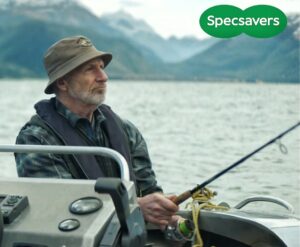 It is supposed to be funny, but then humour is subjective in the eye of the beholder.
It is supposed to be funny, but then humour is subjective in the eye of the beholder.
A commercial for a worldwide optical chain, frequently displayed on television and online, shows a man out fishing in a vast lake with his middle-aged son. Mistakenly the subject of the advertising hooks the boat keys on the end of his fishing line and casts off, the keys becoming unclasped once in the water and are pictured drifting to the bottom of the lake.
Ha ha.
When did vision loss become so funny?
This advertising is more than casual ableism. Given the man’s approximate age — I estimate he may well be as old as I — this is ageism. This is classified as humour in an age where we hear more and more about both the climbing rates of dementia, macular degeneration, and vision impairments.
The advertising is offensive, on so many levels.
I thought we had come a long way from the comic strip humour of Mr. Magoo, a fictional character from the ‘60s who gets into a series of comical situations as a result of his extreme nearsightedness. The strip became an animated television series and was reborn decades later as a film in 1997.
There is nothing comical about loss of vision. It is a sense we rely on to live, to learn, to work and play.
I, as a photographer and writer, rely on my vision. I’ve been dealing with low vision for about five years now. It is a disability, one I have struggled to accept, that I have adapted to with a range of visual accommodations.
I grew up wearing glasses at a time when they weren’t even considered a fashion choice. In primary school, a teacher noticed my problems reading the blackboard. Vision issues have long been recognized as a barrier to learning and I was fortunate to have my need for corrective lenses recognized early.
Yes, for years I tolerated the “four-eyes” jokes.
Using a disability, any disability, as the source of humour is wrong and well past the boundaries of political correctness. It is discrimination that exhibits the common unkindness all too prevalent when someone doesn’t measure up to perceived societal standards.
This Specsavers advertising comes at a time where we are supposedly celebrating our diversity and differences (on any level). This ignorant campaign entirely misses its mark. The second commercial in what is presumably a series of ads, shows a man hooking up his boat trailer to the wrong car, presumably after a day of fishing, and the vehicle drives off.
I can hear the laughter and atta-boys from the marketing mavens of the ad agency that created these commercials.
They must be so proud.
Did they not realize they are offending a wide swath of the population that rely on eyeglasses? Isn’t it the company’s marketing mission to sell eyewear to this sector?
The advertising doesn’t even show the wide array of fashionable frames that are available these days; not one single pair of eyeglasses is visible in the entire commercial. This is classified as “lifestyle advertising” by a company that obviously doesn’t realize vision loss is a lifestyle for many, particularly older adults living with an assortment of ocular diseases and disorders.
Instead, they poke fun at its target market.
The optics are not good.
It is not humorous.
I see, regularly, an optometrist and ophthalmologist(s) for testing and treatment. My vision changes, often with varied symptoms, and I switch up my eyeglasses continually.
I, surely, won’t be visiting Specsavers when it comes time for a new pair of spectacles. I can’t see my way to visiting an optical chain that purposely chooses to offend a growing segment of the marketplace. I’m sure I am not alone.
© 2023 j.g. lewis
Leave a Reply